3 tech-enabled strategies to get ahead of FAFSA setbacks early
Because of the delayed FAFSA release, community colleges are scrambling to package aid for students in a timely manner. Additionally, fewer people are filing FAFSAs, and community colleges have received aid forms that have errors —both of which can slow aid packaging as colleges work to encourage students to complete the FAFSA and fix mistakes.
Understandably, financial aid offices have been inundated with questions from students about the new changes, processing errors, and when aid will be packaged. Community colleges may be experiencing heightened pressure compared to other institutions because for many two-year students, attending school simply isn’t feasible without a clear financial plan.
Learn 7 ways to support (and yield) students despite the FAFSA delay
The role of coordinated care in financial support
To ensure students always have direct access to financial aid experts, Hudson County Community College and Holyoke Community College have integrated the financial aid office into their coordinated care strategy. A Coordinated Care Network is a holistic group of support providers, called care units, that collaborate to meet each student’s specific needs through technology and streamlined processes.
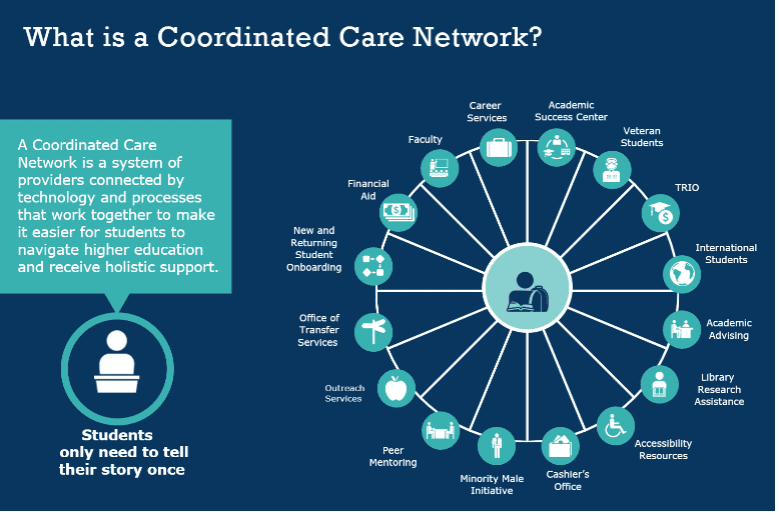
Here is how Hudson County and Holyoke use this approach to help students complete their FAFSAs, schedule appointments with aid experts, and manage SAP obligations so students can focus on their courses, instead of worrying about paying for college.
1. Grow number of aid packages with early alerts and coordinated outreach (Holyoke Community College)
At Holyoke, students are invited to complete an online orientation during the enrollment process. In Spring 2023, admissions and financial aid staff discovered that only 53% of orientation attendees had a completed financial aid package. Of the students with incomplete packages or no FAFSA on file, many didn’t know they were missing requirements or how to fulfill them.
Holyoke lacked an alert system to notify students or financial aid staff of these missing items, leading many students to seek assistance from their academic advisors rather than financial aid counselors, or to not complete their aid applications altogether.
Recognizing this as a threat to enrollment and holistic student support, Holyoke used Navigate360 to create alerts for students who enrolled in orientation and submitted the FAFSA but were still missing required items. These alerts connected students with financial aid counselors who could provide expert guidance on completing their aid package requirements. Furthermore, academic advisors could view which of their students had alerts for incomplete aid requirements and track when cases were closed.
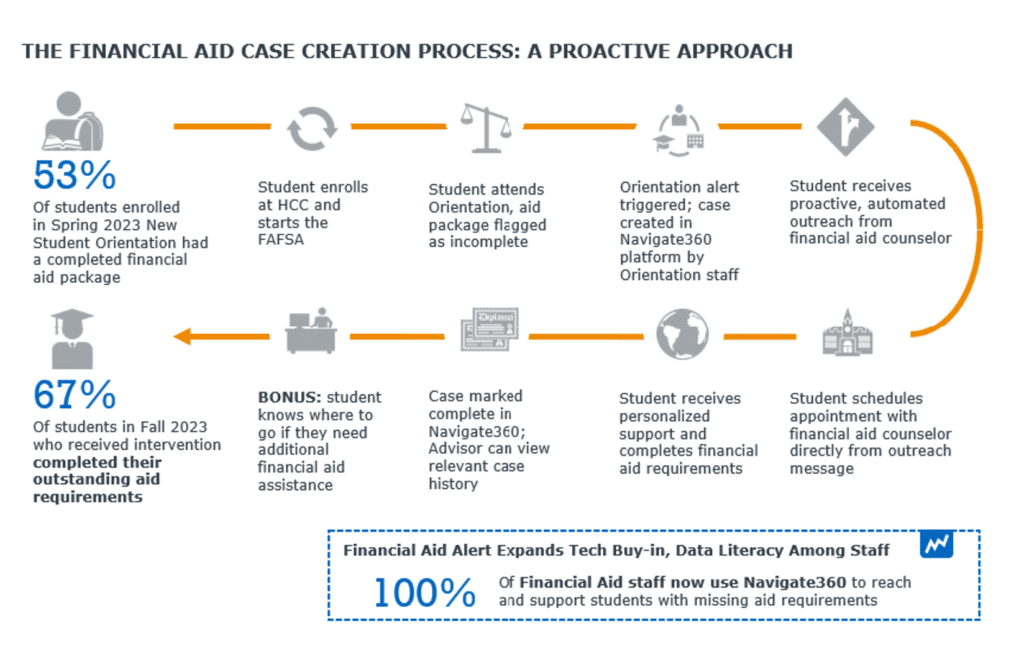
By Fall 2023, Holyoke’s Missing Aid Requirements Alert drove a 14% increase in completed FAFSA packages among newly enrolled students. Holyoke’s financial aid team is now a top user of Navigate360 alerts and reporting capabilities—100% of the financial aid staff are active users—leading to greater transparency and improved coordination between financial services and campus partners.
Previously, our financial aid counselors were often talking to upset students because we were reactive. And I think this has changed the way counselors are viewing their work because now they’re able to be proactive and the conversations are a lot happier.
Kim Straceski, Associate Director of Financial Aid, Compliance, and Customer Service
Holyoke Community College
2. Tech-enabled appointment scheduling with dedicated financial aid advisors (Hudson County Community College)
Case management for academic advising isn’t a new concept, but fewer colleges have used this approach in their financial aid offices. At Hudson County, every student who applies for aid is assigned a dedicated financial aid counselor as part of their coordinated care team. This professional is their personal connection for any aid related question, including FAFSA renewal, verification, satisfactory academic progress, and general aid questions.
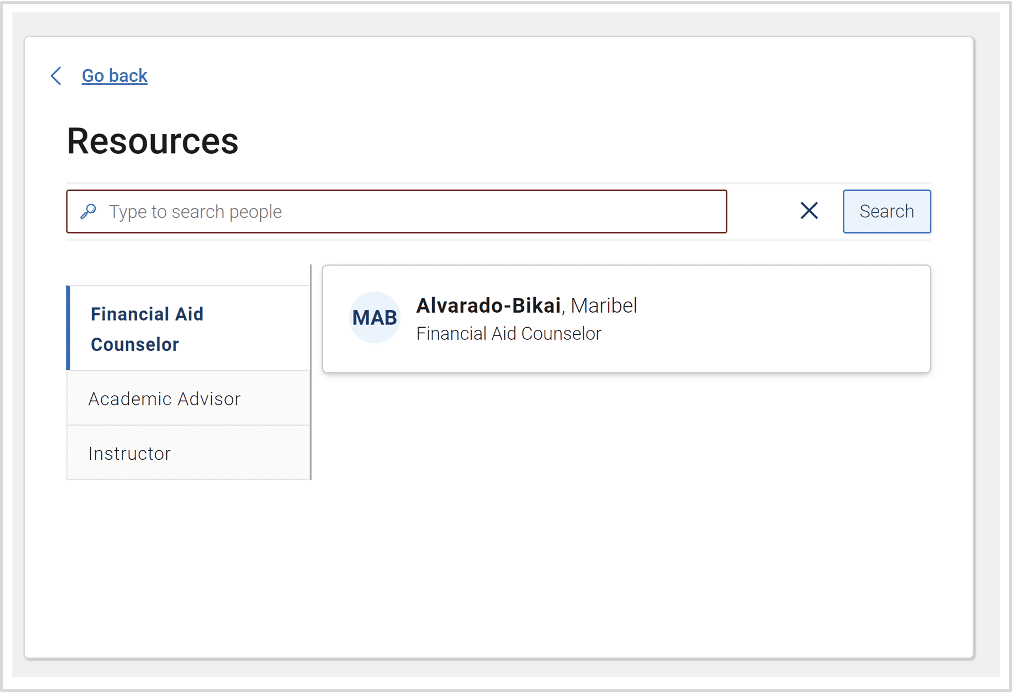
We've had financial aid advisors that are assigned caseloads, who are available for one-on-one appointments, for some time. But we saw students waiting in lines on occasion, and we knew we needed better tools to help with self-service, scheduling financial aid appointments, and sending out communications.
Christine Petersen, Associate Director of Financial Aid
Hudson County Community College
Before adopting Navigate360, financial aid counselors lacked a centralized platform for key information, such as student appointments and messages. This hindered their ability to track relevant student conversations, leading to increased manual effort and potential exclusion of adjacent teams, like advising, from being informed about students’ interactions with financial aid.
Now, students can easily request financial aid advising appointments, either in person or remotely, through the Navigate360 app. Additionally, by utilizing Navigate360, academic advisors can monitor their students’ interactions with financial aid advisors, including meeting notes and appointment attendance status.
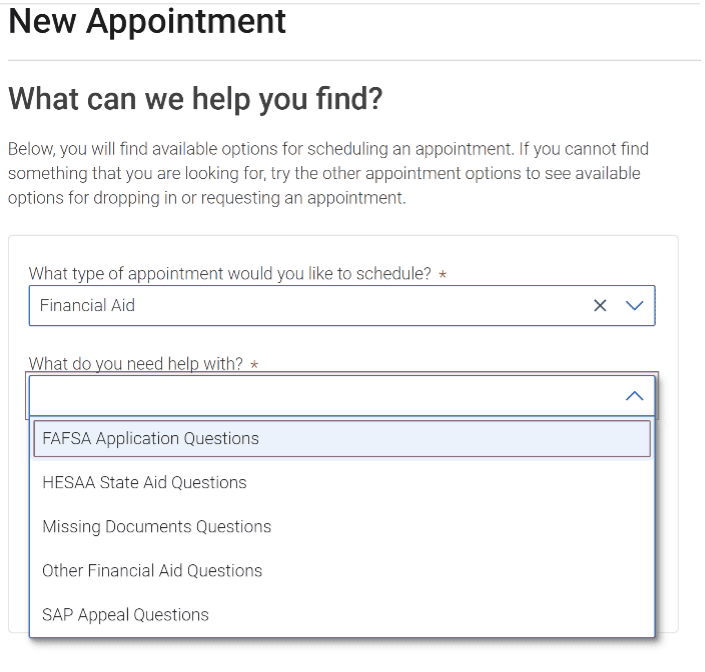
So far in the 2023-24 academic year, 1,072 appointments have been scheduled with a financial aid advisor. More than 400 of these meetings were specifically for questions about the FAFSA application or missing aid documents. According to Sylvia Mendoza, Dean of Financial Aid, “it’s worth noting that students who complete the FAFSA and provide the necessary documentation for financial aid consideration are typically more likely to receive aid.”
3. FSAP alerts for high touch guidance (Hudson County Community College)
Helping students navigate Financial Satisfactory Academic Progress (FSAP) requires close coordination between financial aid and academic advising. Many students may not realize their academic performance directly impacts their financial aid, leaving them unsure of what to do or where to turn if they’re struggling.
To address this challenge, Hudson County recognized the need for clearer guidance for FSAP students and advocated for closer collaboration between financial aid and academic advising. Beginning in Spring 2024, when a student is identified for FSAP by the financial aid department, a case is automatically generated in Navigate360.
This immediate notification alerts the student’s academic advisor that the student needs to complete an academic plan, which serves as a roadmap to outline academic goals, identify potential challenges, and establish strategies for success. When financial aid and academic advising communicate between departments, it’s more likely that a student will follow their academic plan and meet the requirements for aid recovery.
The benefit of this approach is that it guides students directly to the support they need. Tracking within Navigate360 allows a streamlined process. Financial aid counselors collaborate with other members of a student's care team through the issue alert system, which can identify and flag potential financial aid issues early, allowing for timely intervention and support.
Sylvia Mendoza, Dean of Financial Aid
Hudson County Community College
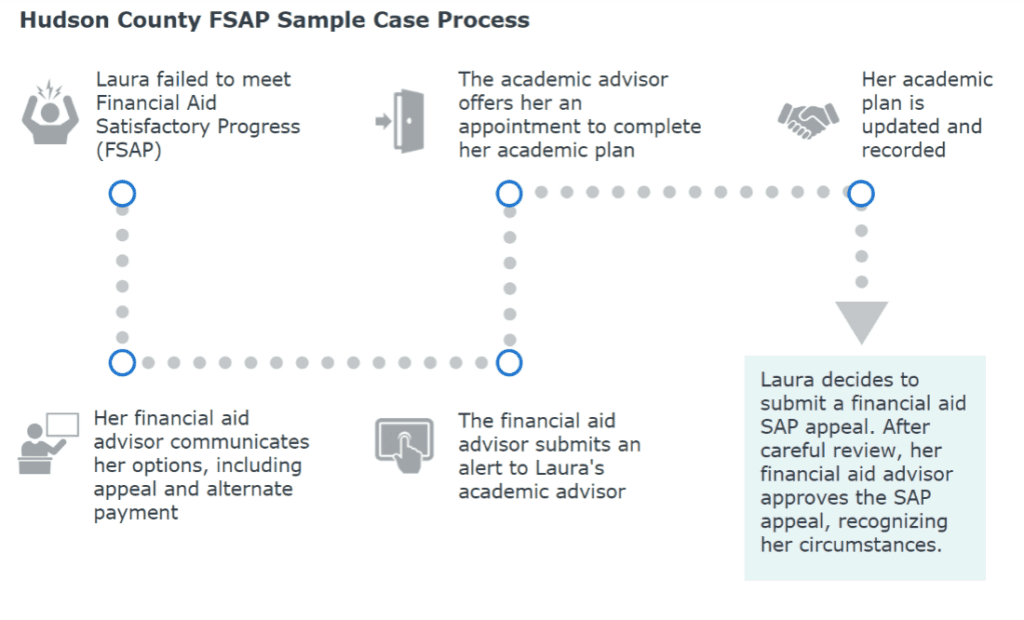
As an additional layer of support, financial aid counselors also use communications campaigns within Navigate360 to send weekly messages to FSAP students.
To date, in the Spring 2024 term 318 FSAP alerts have been created. This coordinated approach has resulted in over 90% of FSAP students having a completed academic plan of file.
Access 72 proven outreach campaign ideas
Turn challenge into opportunity
Navigating financial aid can be stressful for students, especially amid large scale changes to the application process. By prioritizing tech-based personal interactions, clear communication, and increased accessibility to appointments with financial aid experts, colleges can do their part in making sure students access all the aid available to them.
Navigate360 can help create smoother workflows between your financial aid office, students, and academic advising. Complete the quick form below to learn more about Navigate360’s holistic approach to student care.
Ready to get started with Navigate360?
To speak with an expert or request a demo, please submit this form.

More Blogs

15 more campus visit tweaks that win over students

What Blockbuster can teach enrollment leaders about AI-powered college search
